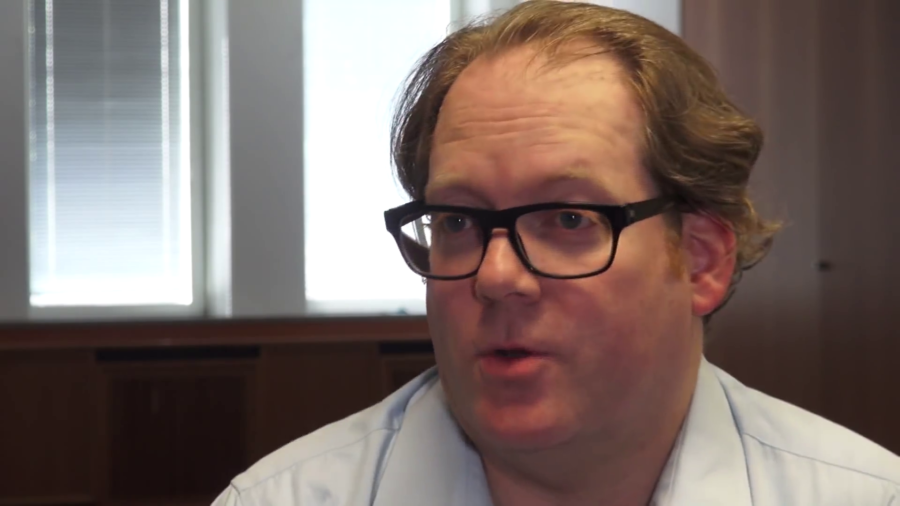Andrew Sullivan: I actually don’t think of myself as leadership, I really think of myself kind of as a servant because I’m not like some of the people who are more exalted. I currently sit on the Internet Architecture Board. I’ve been a working group chair—I still am working group chair of one working group at the IETF. And that’s that’s really what I do, why I’m here in Berlin.
Intertitle: Describe one of the breakthrough moments or movements on the Internet in which you have been a key participant.
So, in 2001 I joined a small company. We were opening the first of the new top-level domains. The top-level domains are the rightmost part: com, org, net. And we were starting a new one called “info.” And so I joined this little company and we got started. And I really didn’t really know that much about the Internet at the time. I joined as a database guy. But I got quickly interested in it, and it was sort of interesting. But the strange thing is I have a very different memory of 2001 than everybody else because of course there were big world events at the time. But I was so busy working on this stuff that I barely noticed. So that was a big event for me.
Over time we’ve invented some changes to the protocols, DNSSEC in particular was something that you you know, it was sort of exciting, to take an old protocol that didn’t have any security and add this authentication of the data. And that’s been something that I’ve worked on. So it’s been a really interesting ride. I get to see the deep guts of the Internet working.
Intertitle: Describe the state of the Internet today with a weather analogy and explain why.
So, by nature I’m sort of a pessimist. It’s one of the natural things with people and technology, and so it’s always cloudy. But it’s cloudy partly because you can’t exactly see what’s coming next. And that’s that’s also very exciting. Storm clouds can be dramatic and they can bring big thunder shows and so on. So I actually like the clouds.
Intertitle: What are your greatest hopes and fears for the future of the Internet?
My big concern right now actually has to do with the tendency of people to want to regulate it. So, the Internet is mostly successful because of the ability of people to do whatever they want. That is, innovation happens wherever you are. You can just add things to it and so on, and nobody’s in charge. And that’s scary for a lot of people who want to run things. They want to be in control. They want to make sure that all the rules are followed. But that’s how innovation happens, right? that there’s not a lot of opportunity to keep control over these things. And I’m worried that we’re in an age where people want to clamp down and try to control everything and try to centralize all of the authority. And I think that’s a mistake, because we’re going to lose the opportunity for new innovation. We’re going to lose the opportunity for new things to be invented on the Internet. That’s my biggest worry.
Off-screen Interviewer: And the opposite of that, what’s your greatest hope for the future of the Internet?
Well, my greatest hope is that we won’t do that. And instead we’ll continue to see this enormous expansion of services. People just invent things, right. When I started in this, Facebook wasn’t a gleam in anyone’s eye and now it’s this massive platform. Twitter, the same thing. All of those kinds of services that everybody just uses now, they’re part of the normal background of the Internet. And yet they weren’t invented when I started using the Internet. Nobody even had an idea that this was possible.
When I first connected to the Internet, the Web didn’t exist. And the ability of people just to do those things at the edge is incredibly exciting, because then this thing comes along, and you see it, you’ve never seen it before, and now it takes off and it’s a big deal. I think that’s just the most wonderful thing. I don’t know what’s going to be invented next, and that’s so fun.
Intertitle: Is there action that should be taken to ensure the best possible future?
Nothing. That’s the best thing about this, that we don’t actually have to do anything. We can not do things, and it’s the not doing that’s going to get us the most innovation. We can just leave things alone to grow in the way that they do. If we don’t take action, then we actually get the biggest benefit.
Intertitle: Is there anything else you would like to add?
I think the thing that’s really exciting right now is this expansion into areas that…parts of the world that don’t have the infrastructure. ICANN, for instance, was just in Africa; there was a meeting there. And you know, there are parts of Africa that have very very poor infrastructure, they’re not very well connected and so on. And yet they’re coming online because they skipped a whole generation of connectivity. They didn’t run any wires. It’s all mobile, for instance. It’s all cellular. And that is so exciting because there’s a whole new population that is joining this global system. And we’re getting this enormous opportunity of communication across linguistic and cultural boundaries that we just didn’t have before. So I’m really positive about this. It’s such a cool time to be alive.
